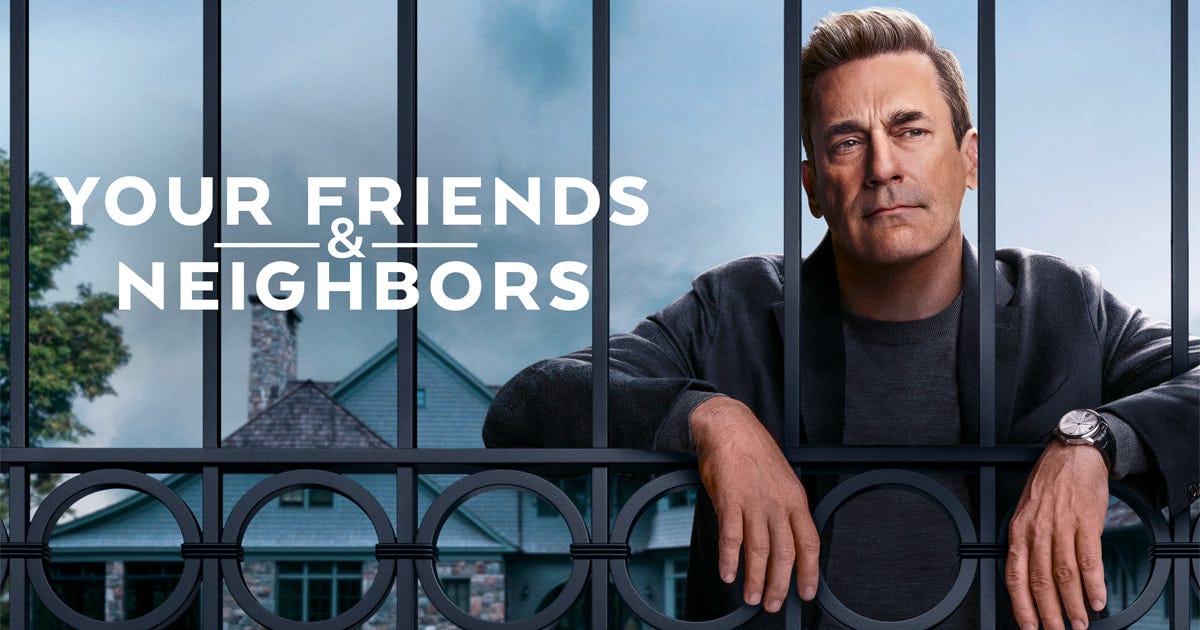Issue #001 of Storied — breaking down storytelling from page, screen, and feed so you can tell better stories
Why we love the “I-make-bad-choices” narrator
Lightttt spoilers for the first episode of Your Friends & Neighbors, the latest series from Apple TV, from writer-creator Jonathan Tropper
I first read Jonathan Tropper in my early 20s.
Fresh off a breakup and in my “trying-to-casually-wear-skinny-ties” era, I was meandering through the rows of my library when I stumbled upon The Book of Joe.
I cracked open the plastic-wrapped blue cover and skimmed through the first few pages. Suddenly, I was snorting in the aisle — instantly hooked by the narrator Joe’s provocative, deliciously dry wit.
The first chapter unfolds with Joe sharing how his best-selling autobiographical novel (which begins with the memory of walking in on his older brother hooking up in their parents’ garage) was turned into a blockbuster movie and made him rich, minorly famous, and majorly shunned from his hometown and everyone he grew up with.
Only now, years after money and success, was Joe beginning to re-evaluate what he’d lost after all he’d gained.
“Any scmuck can be unhappy when things aren’t going well, but it takes a truly unique variety of schmuck, a real innovator in the schmuck field, to be unhappy when things are going as great as they are for me.” — The Book of Joe
Page turner to Apple streamer
A sardonic, down-on-his-luck narrator whose cleverness and self-awareness can’t save him from trouble of his own making... Sound familiar?
The same can be said for Coop, the lead character played by Jon Hamm in Jonathan Tropper’s latest hit, Your Friend & Neighbors (which just became Apple’s most-watched new drama series).
Before we dive into Coop’s chaos, let’s catch you up to speed on Tropper’s glow-up over the last two decades since The Book of Joe.
Tropper’s gone from writing novels to screenplays (Kodachrome, The Adam Project) to creating and producing TV series (Banshee, Warrior). Last year he was tapped to write the new Star Wars film starring Ryan Gosling.
Anddd of course, his latest show for Apple TV, Your Friend & Neighbors, debuted in early April 2025 and was renewed for a second season months before it premiered.
Which, of course, brings us back to Coop.
Fired from his cushy hedge fund job, Andrew “Coop” Cooper resorts to stealing from the homes of his ultra-rich neighbors to maintain his lifestyle… until he breaks into the wrong house.
Throw in navigating a messy divorce, his on-and-off again intimate entanglement with another neighbor, and taking care of his wayward sister, Coop narrates us through the show with the same dry wit and irreverence Tropper is known for.
“I couldn’t help but catch a fleeting glimpse, out of the corner of my eye, of the swirling hot mess of my life, and wonder how the hell everything could go so wrong so fast.”
— Your Friends & Neighbors, Ep 1
My wife and I loved the series, with the finale airing last Friday, and it had me thinking (while mindlessly cleaning baby bottles at 3 am) why we love the “can’t-help-but-make-bad-choices” narrator.
So let’s get into it…
Channelling flawed narration in your own stories
We’ll touch on Tropper’s style here, then break down what makes this kind of flawed POV land — and where it can fall apart.
There’s a rhythm to this
Tropper’s narration has a musicality to it.
From legato run-on sentences that ensare you with vivid metaphors and buzzy adjectives… to staccato needle drop one-liners that land like a punchline.
Whether you’re writing fiction, preparing a presentation or crafting a post to share on social, varying the length of your sentences will keep your audience engaged.
I’ve always thought the best example of this is Gary Provost’s breakdown of the power of using sentences of different lengths:
Wit sharpened by vulnerability
Tropper isn’t just clever — he’s disarming.
He wraps his sardonic prose in authenticity and vulnerability.
You might make someone chuckle with a clever line. But if you want them to remember your words, you’ve got to hit them with originality.
With a freshness and a relatability that comes from revealing a truth, fear, belief.
“I misplaced my inner monologue and my wife right around the same time.”
— Your Friends & Neighbors, Ep 1
Try this with your own storytelling — take a flat moment, and punch it up with your own twist on authenticity.
Why should we care?
The most important thing about using a flawed protagonist is giving your audience a reason to root for them.
Always ask yourself: Why should we care?
Why would someone stick with this story if this character drives the plot?
The bottom line: Though we may not agree with all of a protagonist's choices (hell sometimes you might not even like them), we should want to see them succeed.
So how can you create that attachment? Give depth to your hero or antihero by providing justifications for their misguided actions.
Perhaps they’re a family man (like Walter White or Marty Byrde) who got caught up on the wrong path trying to make ends meet. Or a billionaire playboy philanthropist who’s learning humility through hardship.
So how do we do this? Well, there’s a reason save the cat became such an effective (albeit cliche) storytelling trope.
But we can be better than a feline plot device.
It’s all about stakes.
Proof that Tony Stark has a heart
The fastest way to get buy-in to your character? Stakes.
What does the protagonist gain or lose depending on the outcome of your story? Why do they matter? Don’t just think macro, think internal.
That is to say… sure, Tony Stark (or any Marvel hero)’s stakes are:
Stop the villain
Save the world
But relatable, emotional stakes are what get us to care.
The first Iron Man is all about Tony’s quest to redefine his identity after recognizing the deadly consequences of his arrogant and reckless genius.
He wants accountability instead of profitability.
And though we can’t all relate to an armour-wearing eccentric futurist narcissist, we can relate to someone actively trying to take responsibility for their actions and be better than they were.
The takeaway: Messy but meaningful
So what can we learn from our love of flawed narrators? Don’t be afraid to be flawed.
We’re drawn to cracks because that’s where we see ourselves.
The best stories aren’t about perfection — they’re about pursuit.
Stories this week
Here are the stories I’ve been drawn to over the last week, and please reply to this email with any suggestions you have. I loveee recommendations.
What I’m watching: Survivor 48 Finale
What can the best show on TV Survivor tell us about storytelling?
If you’re a fan — and hell if you’re not after almost 50 seasons, give your head a shake — you know that storytelling is everything.
If you haven’t had
the best host on TVJeff Probst grace your screen in several years, the game has evolved from its origins as a somewhat shallow early 2000s “group of castaways compete in challenges for a million dollar prize”.Now the show is branded as a “social experiment” with players focusing on strategically navigating complex social dynamics and targeting other competitors who could make it to the end and tell the best story.
This seaons’s finale was filled with great players who each had very personal and moving stories to tell the jury. So who told the best story and was crowned Sole Survivor? No spoilers here.
Future newsletter idea: The power of storytelling on Survivor
Takeaway: Ask yourself, “What story am I telling people about myself?” Or perhaps more existential crisis-inducing: “Am I living the story I want for myself?”
What I’m reading: The Devils by Joe Abercrombie
Joe Abercrombie, the New York Times best-selling author and undisputed King of grimdark fantasy, is back with The Devils.
Here’s the one-sentence pitch:
A notorious band of anti-heroes embarks on a delightfully bloody and raucous journey. Holy work sometimes requires unholy deeds…
Abercrombie first captured my attention with his 2006 novel The Blade Itself, which turned into an epic just-shy-of-a-dozen stories The First Law series.
He’s a master of flawed characters, weaving into his stories so many distinct and unforgettable POV characters (from the infamous Logen Ninefingers to the tortured turned torturer Inquisitor Glokta).
A film adaptation of the standalone novel, Best Served Cold, is currently in pre-production with Tim Miller set to direct and Rebecca Ferguson attached to star.
Takeaway: What I love most about Joe’s writing is how his characters often get exactly what they want — and only then realize it cost them who they were.
What I’m listening to: Michelle Williams on Armchair Expert
Michelle Williams is a wonderful and heartfelt interview on Armchair Expert.
As they walk through her humble beginnings from Dawson’s Creek to five Academy Awards nominations, I found myself spellbound by Michelle’s soft yet evocative descriptions of her childhood, acting, and parenting.
Here’s one of my favourite moments, where Michelle talks about how nature was her greatest teacher when she was a child because it was a place where she could explore freely, make mistakes, and learn by listening:
It is the thrill of your skin in the wind and the understanding that your survival depends on you and only you. And so you're constantly assessing your own comfort with danger and your own ability to keep yourself safe…
And that feedback loop that a child gets when they decide which rocks are the safe rocks, which one isn't slippery, which one isn't too pointy — When they're quite literally getting their footing, it is feeding their body with information about how to take risks.
— Michelle Williams, Armchair Expert
Takeaway: As a new Dad, I loved listening to Michelle’s soft-spoken reflections on balancing creativity and parenting, especially when she described telling her daughter, “It tastes better to me when you eat it,”.
Wish I wrote this
“We tell ourselves stories in order to live.”
— Joan Didion
Thanks for reading the first issue of
.I’d love to hear what you think —say hey on LinkedIn or find me on alllll the socials as @ScottyShares
If you liked this issue, please share it with a friend. See you in the next one!











